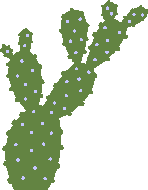 Using the Internet to Find Gardening Information - October 6, 2004 Jeff Schalau, County Director, Agent, Agriculture & Natural Resources Arizona Cooperative Extension, Yavapai County The Internet started in the 1960’s as a communications network within the scientific and military communities. Since it became widely available in the early 1990’s, the popularity and value of the Internet has continued to grow. Like anything, it has its positives and negatives. Those that use E-mail can attest to the proliferation of unsolicited messages (SPAM) and computer viruses. Yet, there is also a wealth of reliable, scientific information available almost instantaneously. For more and more gardeners, the Internet has become another valuable garden implement. People used to say that using the Internet was only for the elite few. This may have been true a few years ago, but today the Internet can be accessed by anyone attending school and or accessed at most public libraries. According the U.S Census, home Internet access has increased from 19% of households in 1998 to 60% in 2003. Prices of personal computers have dropped and availability of Internet connectivity has increased. If you need help learning how to use the Internet, I’ll provide a few pointers in this column. Otherwise, just ask any eight year-old. Searching for reliable information begins with knowing something about how Internet search engines work. Search engines are tools that can locate information on the Internet (World Wide Web). Examples of search engines are Google, AltaVista, Yahoo, Excite, WebCrawler, and there are many others. Enter keywords into the search engine, hit the search button, and it searches the web for sites that contain those words. The results are returned based on the strength of the search word relationship and sites are listed that can be explored further. It is best to enter two or more words to narrow your search. For instance, if I was looking for information on planting dates for broccoli, I would enter three words: “Arizona broccoli dates”. When I did this, the search results displayed the Arizona Master Garden Manual’s Vegetable Planting Guide which contains planting dates for all areas of Arizona. When searching for information on the web, I always question the reputability of the information I find. Many web sites are trying to sell or advertise something. Other sites may be from other geographic areas and contain information that is correct for their local growing conditions, but may be erroneous for your situation. The “reputability issue” is always there and net surfers should be aware of it. Information from Universities, major gardening publications, reputable garden catalogs, and government entities is usually more reliable than someone or something you have never heard or thought of. Remember, anyone can create a web site. I often begin my keyword searches with the word “Extension” to access Cooperative Extension web information. It is scientifically valid and written for general audiences. If Arizona specific information is not available, then I try one of the neighboring states. California, New Mexico, Utah, and Colorado Cooperative Extension have particularly good gardening/landscaping information. California Cooperative Extension also has the best pest management information of any site I’ve ever visited. I’m not providing web site addresses in the text of this column. That’s because I want you to go to the web, select a search engine, and find it yourself. If you have trouble, type in “Backyard Gardener”. When you get to this column in the Backyard Gardener web site, all the above mentioned sites will be hot-linked for you (see the links below). By the way, the Backyard Gardener web site had 320,663 visitors in 2003. When you visit me on the web, you can search through 300+ Backyard Gardener columns in the archives. You can also make comments and suggest topics for future columns. For that matter, the topic of this column was suggested by a reader. See you in cyberspace! The University of Arizona Cooperative Extension has publications and information on gardening and pest management. If you have other gardening questions, call the Master Gardener line in the Cottonwood office at 646-9113 ext. 14 or E-mail us at mgardener@verdeonline.com and be sure to include your address and phone number. Links To Cooperative Extension Web Sites in Adjacent States University of Arizona Cooperative Extension at cals.arizona.edu/extension/ University of California Cooperative Extension at ucanr.org/CES.CEA.shtml University of California Cooperative Extension Integrated Pest Management at axp.ipm.ucdavis.edu Colorado State University Cooperative Extension at www.ext.colostate.edu University of Nevada Cooperative Extension at www.unce.unr.edu New Mexico State Cooperative Extension at www.cahe.nmsu.edu/ces/ Utah State University Cooperative Extension at extension.usu.edu/cooperative/ |